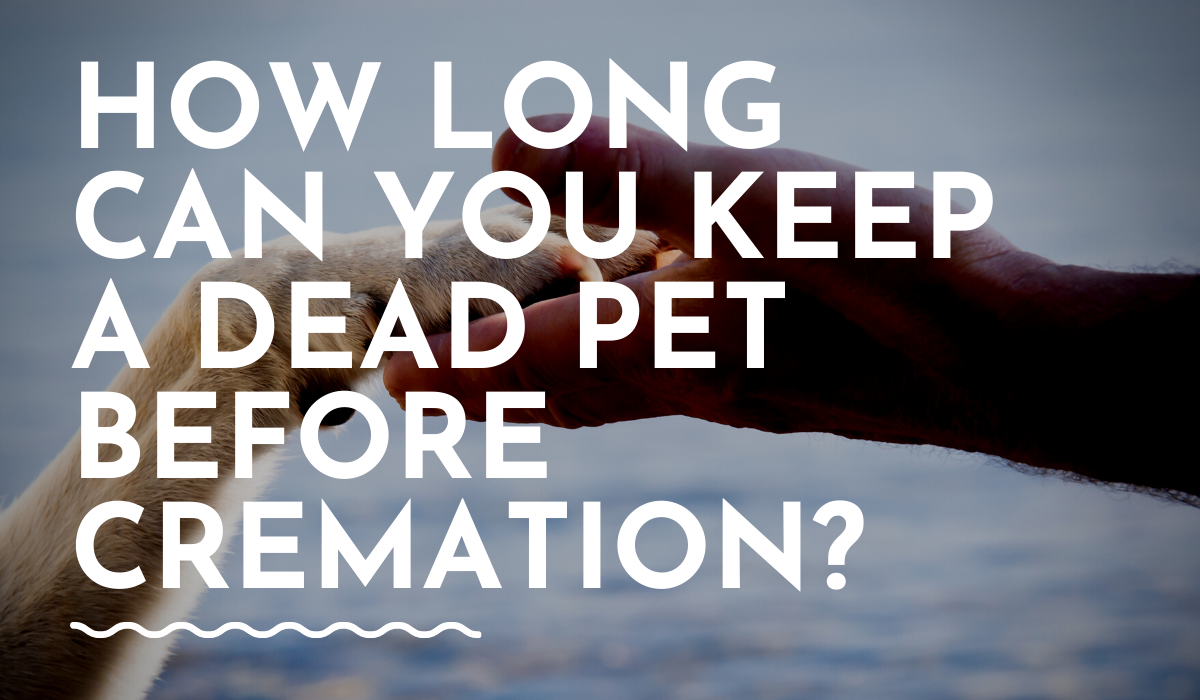The death of a beloved pet can be an incredibly difficult and emotional experience for any pet owner, and while saying goodbye to a pet can be heartbreaking, it’s important to know that there are still some tasks to take care of when the time comes.
One common question owners ask is how long they can keep the dead pet before deciding on cremation.
Generally speaking, most crematories recommend that pet owners cremate their departed pets between 24 and 48 hours after passing.
In this guide, we will talk about what’s the best time to cremate your pet and provide helpful tips on the best ways to memorialize your beloved four-legged friend.

How Long Can You Keep a Dead Pet Before Cremation?
It may seem like an uncomfortable topic, but being aware of what happens to our pets after they pass away is an essential part of being a responsible pet owner.
When it comes to keeping a dead pet before cremation, owners have several options.
Generally speaking, the amount of time you can keep your deceased pet depends on environmental factors such as temperature or humidity and other considerations like religious traditions or personal preferences.
In most cases, it’s best not to wait longer than 48 hours before cremating or burying your pet, as this could lead to tissue decomposition and potential health hazards from bacteria or parasites in the animal’s body fluids.
In extreme cases, such as hot climates or a lack of refrigeration facilities, you may need to consider other options, like burying your pet safely; however, as burying animals in residential areas is illegal in most places, make sure to check your local laws before proceeding.
It’s also important to remember that if you decide to hold onto your deceased pet for more than 24 hours, you will probably need a permit from your local animal control office to do so legally.
Why You Should Consider Cremation
When dealing with the loss of a pet, facing the reality that you need to address this process can be difficult. But cremation is often a good option for those who want their beloved pet’s remains to be respectfully treated and cared for in their absence.
Cremation is a way to provide closure by honoring the life of your pet and providing a memorial that can be kept in remembrance.
Cremation also offers certain practical advantages. It is often more cost effective than traditional burial, and it doesn’t require a physical burial space for the pet, so there is no need for concern about the availability of sufficient land for a proper burial or the associated legalities.
What Are the Benefits of Pet Cremation?
Cremating a deceased pet is becoming increasingly popular, mainly due to its convenience and cost savings compared with burying them in the ground.
Additionally, pet cremation provides an opportunity for owners residing in apartments or rental homes where traditional burials are prohibited to pay tribute to their deceased pets.
This option enables them to find closure by respectfully keeping their pet’s remains nearby or scattering them in a meaningful location associated with their cherished companion.
Finally, opting for pet cremation contributes to environmental sustainability. By choosing cremation over traditional burial methods, pet owners reduce the impact on land use and minimize the carbon footprint associated with traditional burials.
This eco-conscious choice aligns with the growing trend towards more environmentally friendly end-of-life practices, allowing pet owners to honor their beloved companions in a way that is also considerate of the planet’s well-being.
What Happens When Your Pet is Cremated?
When a pet is cremated, the process typically involves placing the pet’s body in an incinerator that is then heated to high temperatures that reduce the body to bone fragments.
These fragments are then further processed into a finer ash-like substance known as cremains. The cremains are carefully collected and placed in a white plastic bag which is then placed inside an urn or container and returned to the pet owner.
Pet cremation allows owners to keep their beloved pet’s remains close by or memorialize them in a special way, providing a sense of comfort and closure during the grieving process.
Can You Cremate the Pet Yourself at Home?
No, it is not recommended or legal to cremate a pet at home.
Cremation requires specialized equipment and materials that regular households do not have, as well as the necessary permits from local authorities.
Additionally, certain health hazards are associated with handling dead animals, such as bacteria or parasites that can be present in the animal’s body fluids and can find their way into your household.
Furthermore, fire hazards are another significant concern when attempting to cremate a pet at home, as the process of cremation involves extremely high temperatures that can pose a serious risk of fire if not conducted in a controlled environment with proper safety measures in place.
Finally, cremating your pet yourself can be an unnecessarily complicated and emotionally challenging task. Handling the cremation process yourself can intensify the emotional burden of saying goodbye to a beloved pet, as it involves confronting the physical remains directly.
Therefore, to avoid endangering the property and the safety of the individuals involved and not have to put yourself through additional trauma, it is always advisable to entrust the cremation of a pet to trained professionals who can ensure the process is carried out safely and responsibly.
What Are Costs Associated With Cremation?
The cost of cremating a deceased pet varies depending on its size and weight (smaller animals typically cost less) and where you live geographically, as prices tend to vary from region to region.
On average, though, expect anywhere between $50-150 depending on whether you decide for individual or communal cremations, which involve multiple animals at once being burned together inside one large chamber at once (the latter is usually cheaper).
Prices may also include additional fees for transporting the animal from your home as well as providing storage services until arrangements are made for final dispositioning via either burial in a cemetery plot or scattering over water/land, etcetera.
What Can You Do With Your Pet’s Ashes?
Once the cremation process has been completed, owners have several options when it comes to what they choose to do with their deceased pets’ ashes; these include:
- Burying the ashes in a cemetery, pet memorial park, or backyard.
- Keeping them in an urn at home.
- Scattering the ashes over water or land.
- Incorporating them into jewelry, artwork, or other keepsakes.
No matter which option you choose, remember that cremation is about honoring your pet and providing a lasting memory of them to keep close in your heart.
It’s important to take the time to consider what option feels right for you and make sure all local laws are followed before making any final decisions.
If you plan on keeping a deceased pet’s ashes at home, be sure to store them in a secure place away from children and other pets. Taking the time now to plan for cremation can make all the difference later when it comes to making sure your beloved pet is treated with love and respect after they are gone.
Memorializing Your Pet
For many pet owners who lose their beloved companion animals, deciding how best to honor their memory can be just as difficult as dealing with their loss itself.
Creating a memorial of some kind to commemorate their life, whether organizing a group gathering or planting a tree in memory of them, can be an effective way to cope with the loss.
You could also consider creating something tangible such as a photo album or an online tribute page where friends and family can leave messages and share fond memories of the pet.
This kind of tribute can be a great way to remember all the joy and love your pet brought into your life over the years. No matter how you choose to memorialize your beloved companion animal, know they will continue to live on in your heart forever.
